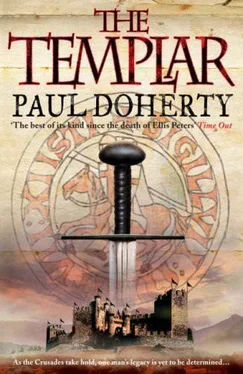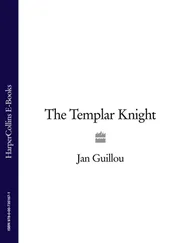P. Doherty - The Templar
Здесь есть возможность читать онлайн «P. Doherty - The Templar» весь текст электронной книги совершенно бесплатно (целиком полную версию без сокращений). В некоторых случаях можно слушать аудио, скачать через торрент в формате fb2 и присутствует краткое содержание. Год выпуска: 2010, ISBN: 2010, Издательство: Minotaur Books, Жанр: Исторические приключения, на английском языке. Описание произведения, (предисловие) а так же отзывы посетителей доступны на портале библиотеки ЛибКат.
- Название:The Templar
- Автор:
- Издательство:Minotaur Books
- Жанр:
- Год:2010
- ISBN:9780312576837
- Рейтинг книги:5 / 5. Голосов: 1
-
Избранное:Добавить в избранное
- Отзывы:
-
Ваша оценка:
- 100
- 1
- 2
- 3
- 4
- 5
The Templar: краткое содержание, описание и аннотация
Предлагаем к чтению аннотацию, описание, краткое содержание или предисловие (зависит от того, что написал сам автор книги «The Templar»). Если вы не нашли необходимую информацию о книге — напишите в комментариях, мы постараемся отыскать её.
The Templar — читать онлайн бесплатно полную книгу (весь текст) целиком
Ниже представлен текст книги, разбитый по страницам. Система сохранения места последней прочитанной страницы, позволяет с удобством читать онлайн бесплатно книгу «The Templar», без необходимости каждый раз заново искать на чём Вы остановились. Поставьте закладку, и сможете в любой момент перейти на страницу, на которой закончили чтение.
Интервал:
Закладка:
‘Under the Rock,’ she translated, ‘look on the treasures of God and the face of the Lord.’ She moved the lantern horn closer. The diagram meant nothing to her, nor did the words. She sat down, refolded the piece of vellum and tucked it into the hem of her cuff. Fulcher had evidently thought this was important; so had Anstritha. Was this the manuscript the mysterious horseman had been searching for? Anstritha had been out to Outremer; so had Norbert and Alberic. Had they discovered something precious there? Eleanor closed her eyes. She recalled that list of relics held by her brother, and yes, something else: Hugh and Godefroi chanting that poem they so zealously read. Those words on Anstritha’s manuscript sparked a memory of verses in the ‘Chanson’ about the face of Christ. Was there more to the Poor Brethren of the Temple? Anstritha and Fulcher had both died violently, as had Robert the Reeve. Was the latter’s death an accident? And was the horseman now one of their company? They had never really discussed Robert’s death. The reeve was undoubtedly a toper, but how had he drowned in that stream? Did he know something? Had he been inveigled outside and murdered?
Eleanor heard sounds, her name being called. She crawled to the mouth of the tent and pulled back the flap. Hugh crouched there.
‘Sister,’ he smiled, ‘a decision has been made. We, the leaders of the Poor Brethren, will leave immediately tomorrow morning for Constantinople to take urgent council with the Lord Raymond.’
Part 4
Constantinople: The Morrow of the Feast of St Athanasius, 3 May 1096
In quo cessabit mulierum amor et desiderium.
(A day on which the love and desire of women will cease.)
The Dies Irae of St Columba
Eleanor de Payens of Compiègne in the county of Champagne, crucesignati , cross-bearer, sister of Hugh, widow of Odo de Furneval, always swore that the city of Constantinople, old Byzantium, was the nearest thing to her image of the heavenly Jerusalem, despite the treachery, murder and intrigue brewing in that great city by its inland sea. Eleanor and her companions reached Constantinople around the Feast of St Mark the Evangelist. Theodore, their guide, described the city as a rough triangle bounded on two sides by the sea and enclosed within massive twin walls. They entered through the Golden Gate, three sets of soaring bronze doors enclosed by a white-brick, red-tiled wall, which, in turn, was surmounted by two massive golden statues of Victory and four huge elephants carved from the same precious metal.
The Poor Brethren joined Count Raymond at the luxurious villa the Emperor, Alexius Comnenus, had provided for the Provençal leader just off the great highway leading up to the Golden Gate. The count received them well. He grew furious at the news about the Greek attack, though he was full of praise for Hugh’s actions. He was restless, still in deep negotiation with both the other leaders as well as the Emperor’s court. He insisted that they relax whilst they waited. They bathed, dressed in fresh flowing robes, ate soft fruit-bread and fresh lamb roasted in mint and spices, and drank wines that had once, Theodore assured them, drenched the mouths of Alexander the Great and his generals.
In the days following, Theodore proved to be a knowledgeable, courteous and highly intelligent guide. He showed them the glories of the city. They were ushered up marble steps into the great palaces where Varangians, warriors from the north, stood on guard in their gold-edged scarlet cloaks. On their heads were plumed silver helmets, in their hands the two-headed axes that distinguished them as the Immortals, Alexius’ imperial body guard. Past these pattered servants in their silver-slippered feet, hurrying to do the will of the Basileus, the Elect of God, their Christ-Adoring Emperor. Eleanor and her companions also walked the great city walls, thirty feet high and seventeen miles long, and from the summit of the Golden Gate watched the caravans of carts, camels, donkeys and horses bringing in the produce of the empire.
They visited the harbours and quaysides of the Golden Horn where triangular-sailed fishing smacks cut the light-blue, sun-dazzled waters, past imperial galleys with their banks of oars and the huge dragon’s heads arching out over carved prows which, Theodore confided, spat out streams of mysterious Greek fire. In the cool of the evening they wandered the streets, escorted at all times by mercenaries who ensured that these Franks were kept safe and did not wander where they shouldn’t. After the dusty open roads, rocky meadowland and thick forests of their recent march, Eleanor found the contrast dazzling. In the teeming city bazaars, bearded, hawk-eyed men shouted at them in a variety of bewildering languages as they offered camphor oil, sesame, silk from Cathay, spices such as sandalwood and rolls of heavy embroidery. From open-fronted cookshops traders served platters of honey cake, walnuts, chilled cherries and goblets of Chian wine. Afterwards they walked in the imperial gardens, where the Judas trees blossomed and the wild vines grew heavy and lush. Along the waterways cutting through these paradises sailed gilt-edged pleasure barges and imperial galleys resplendent in their pennants. Eleanor would remember such luxury and opulence during the storm of war, disease and famine that would later engulf them. She also kept to her promise that she would discover what secret desires prompted the hearts of those in her company. She began to hint at this whenever she was alone with Hugh, though this was a rare event. Count Raymond depended on Hugh, especially in his discussions with the other lords about the setting up of a council of leaders, establishing a common fund and sharing provisions.
All the great lords were now arriving in Constantinople, bringing with them men of every nationality and tongue. Eleanor had glimpsed these leaders as they visited the luxurious villa to confer with Count Raymond. Hugh of Paris, brother to the King of France, was the first Frank to arrive in Constantinople. The French prince’s small fleet had been shipwrecked, many of his troops drowned, their sea-drenched corpses washed up in inlets and on islands. Nevertheless all these corpses, so it was rumoured, bore red crosses, a miracle, a sure sign that they had fulfilled their vow and would receive God’s reward. Godfrey of Bouillon arrived, iron-haired and harsh-faced, with his ambitious wily brother Baldwin, whilst Adhémar of Le Puy, the scheming, warlike bishop, still nursing his sore head after the attack on him in Sclavonia, led in the rest of Count Raymond’s troops to be comfortably quartered in the fields and meadows beyond the city. Robert ‘Short-breeches’, Duke of Normandy, red-haired and even more red-faced, jovial and laughing, lazy and feckless but a superb horseman and a skilled warrior, came swaggering in. Finally Bohemond, the Norman Prince of Taranto, yellow-haired with the face of a hunting eagle, who stood over six feet, with the powerful arms of a swordsman. A Norman who took to fighting like a bird to flying, Bohemond was no friend of the Greeks. He had fought to carve himself an empire in southern Italy and Greece, only to be repulsed. He now brought five hundred knights under his scarlet banner, eager for Jerusalem but with an equally sharp eye for any territories and fiefs along the way that he could claim as his own. Bohemond was joined by his nephew Tancred de Hauteville, the finest swordsman amongst the Normans, a bird of similar feather to Bohemond though one more concerned about his soul and the blood on his hands than seizing some rich fief.
All these seigneurs gathered like a host of hawks in Constantinople. The Emperor, cunning as a serpent, received them with exquisite gifts: gold and silver, precious cloths, jewelled saddles and harness, fresh robes, baskets of sugared fruits and wines cooled by snow from Olympus, caskets and coffers of gleaming sapphires, small ingots of ivory, damascened covers and finely wrought weapons. Alexius feted and entertained the leaders whilst their followers, seventy thousand strong, stayed outside the city, fed and watered but closely watched by squadrons of Turcopoles in their pointed helmets of grey damascened steel, turbans of white cloth wrapped around their brows. The Turcopoles sported leather body armour over loose jerkins with breeches pushed into high-heeled riding boots. All were well armed with lance, bow and sword. Hugh took careful note of these and ruefully wished the great lords would do likewise: their future enemy, the Seljuk Turks, were similarly armed and adopted the same hit-and-run tactics in battle, to devastating effect.
Читать дальшеИнтервал:
Закладка:
Похожие книги на «The Templar»
Представляем Вашему вниманию похожие книги на «The Templar» списком для выбора. Мы отобрали схожую по названию и смыслу литературу в надежде предоставить читателям больше вариантов отыскать новые, интересные, ещё непрочитанные произведения.
Обсуждение, отзывы о книге «The Templar» и просто собственные мнения читателей. Оставьте ваши комментарии, напишите, что Вы думаете о произведении, его смысле или главных героях. Укажите что конкретно понравилось, а что нет, и почему Вы так считаете.












